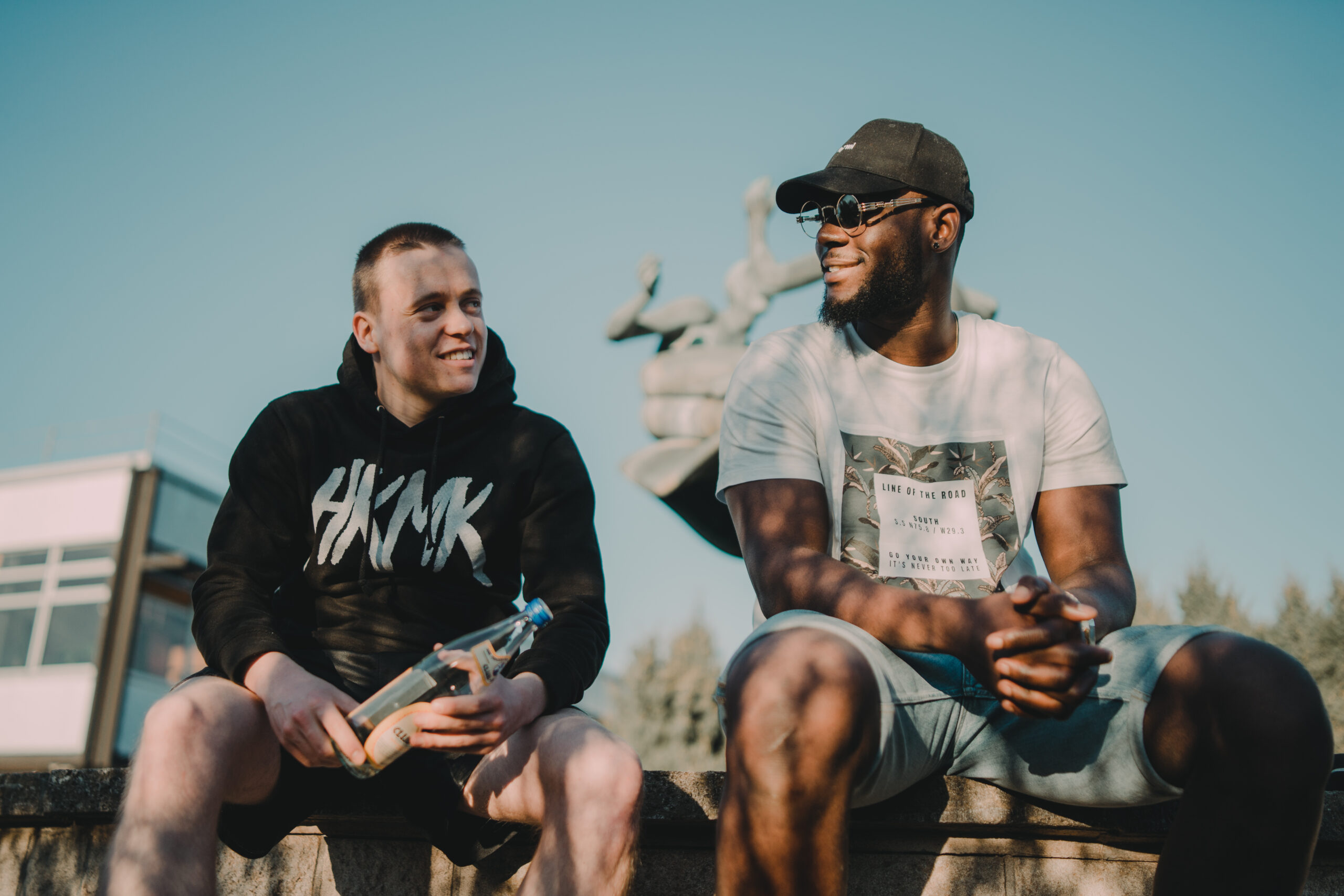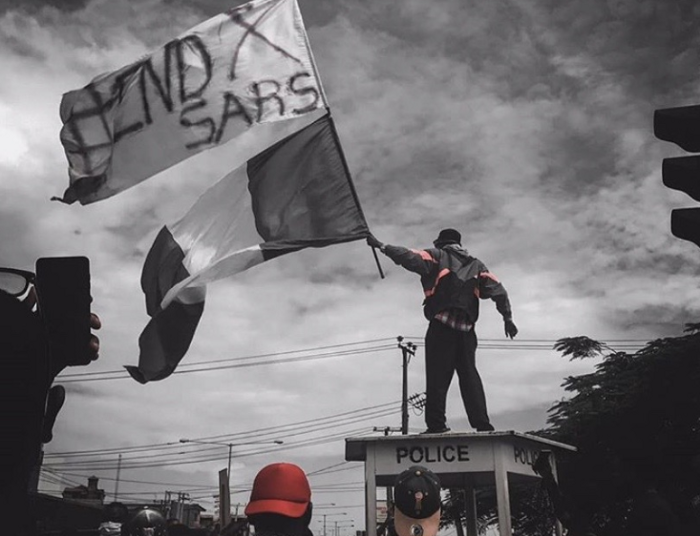contribute
Du hast Fragen, Kritik oder Themenvorschläge für akono? Dann schreib uns gerne.
Gare Anighoro alias Garey Godson is a Berlin-based Nigerian artist, music producer and creative writer. With his sound, which he calls Afrofusion, and his independent record label Room of Understanding, he is forging his own path to success without confiding to the expectations the music industry has of African millennials. With Akono he talked about the current situation in Nigeria, his artistic friendships in Germany and about various concepts of black beauty.
A: What exactly is Afro-Fusion?
G: By Afrofusion I mean a liberating and forward-looking way for African millennials to express themselves without necessarily confiding to the status quo of industry expectations. It is a futuristic perspective on music, as it fuses African melodies with Western influences. It combines rhythms from R’n’B, Hip-Hop, Soul & Afro beats. All these music styles have their roots in Africa, but what I mean is that they have been recommercialised by Western influence. But the original African sounds, colours and melodies can be heard in my music and you can see that this is not American and not Western in terms of interpretation and singing. But the production is in a way a fusion of everything. It is simply very clear or free. My album Still I Rise is inspired by Maya Angelou’s poem of the same name, because it is soulful and rhythmic and promotes ideas like resilience, self-love, strength and beauty on Africans inside the Diaspora and beyond. My musical influences come from international and Nigerian artists such as Jay Z, Lauryn Hill, Nipsey Hussle, Kanye West, Tuface Idibia, T-Pain, Jesse Jags, Odunsi The Engine, Nonso Amadi and Burna Boy.
A: How did you get to this sound? Please, tell us something about your musical career.
G: Music was an important part of my upbringing. My father had a very extensive record collection of international and local artists. At home we always had records by Fela Kuti, Barry Wonders, Marvin Gaye, Majek Fashek, Prince and Michael Jackson. I grew up in a Protestant home and was a member of the church choir as a teenager. At the age of about 19, I started to be interested in music production and wrote songs, sang myself and produced for local artists in Nigeria.
After graduating, I moved to Europe and did a master’s degree in communication and media sciences at the TU Ilmenau. There I met my friend and co-producer Hannes alias HKMK. In 2018, we founded the record label Room of Understanding. First, it was friendship that brought us together, and then music. The more time we spent together, the more we understood how different we were in terms of our cultural experiences. When we decided to make music together, we started to talk more about political issues that affected us in different ways. We had open conversations about different cultural and political ideas. People who grew up in Germany have a certain kind of knowledge and attitude that they are sometimes reluctant to question. I tried to question some things, and we tried to learn from each other in a friendly way. This space of mutual understanding eventually became the Room of Understanding and music productions evolved around it. Much of it breaks boundaries of what people think we should look or sound like, and creates a space where people of any belief or sexuality can feel free to express themselves.
The average Nigerian like myself has been oppressed in so many ways. Especially those of us who live in Nigeria. There are always two ways to escape from oppression: either you become an oppressor yourself when you have the opportunity, or you try to do something to challenge oppression. For my part, I want to question things and set a positive example with my work. The Room of Understanding was therefore also created to help other aspiring creatives find their voice and present their art to the world.

A: You are wearing such a great T-shirt right now with the word „Afro Beauty“ on it. You also wrote a text called An Ode to the Black Skin. Do you want to tell us something about ideas of Black Beauty that underlie your music?
G: In high school I had a great literature teacher who knew history well, took us to poetry readings and theatre performances and introduced us to the world of Black writers: Léopold Sédar Senghor, Maya Angelou, Wole Soyinka and others. A recurring theme in their works was that of Black Pride and Black Beauty. I was privileged to learn about my cultural heritage and that we were kings and queens before the exploitation of the African continent. The Négritude movement, which began in the Francophone and Caribbean region long before I was born, helped me to understand the fact that Black is Beautiful. This knowledge also gave me a better insight into Africa’s contribution to the global arts and sciences.
It is a privilege as an artist to have the opportunity to define and transform narratives. In times like these, I am convinced that literature, music and art in all its forms are important tools for social change. For Black people around the world, this year has been a key moment for reflection and action. I believe it is time to shake up the status quo by engaging in meaningful dialogue and re-shaping the narrative through agendas that bring about change. We all have a role to play in shaping the future through our voices, our platforms and our solidarity with our Black brothers and sisters at local and international level.
A: A line from your song Tha Juice goes „When you come from where I come from you know that we don’t give up“ and you keep referring to the poem Still I Rise by Maya Angelou. What does it mean for you in life to overcome obstacles?
G: Yes, in fact the poem comes from a time of strong segregation and is an ode to being black and the ability to rise above obstacles in life. In Nigeria you always have to find a way. I can’t put that in a good light. If you feel that the government does not have your back, you have to find a way. There are many young people in Nigeria who have created things from scratch or put things together or outsource things. So it is up to us to find our own way. That’s the hustle spirit.
A: Let’s talk about Nigeria again. What is your assessment of current events?
G: Young Nigerians have gathered for the #endSARS protests to raise their voice for police reforms, to put an end to corruption and to demand state restructuring, especially regarding access to education and employment for young people. I think this is also an intergenerational conflict: many young people feel that they older generation has failed them. But it is only now that we are at the forefront of issues of social justice, that we are beginning to understand more of the dynamics which have led many older people to give in and settle into the system. But we are empowered to change things through new technologies and contact with different parts of the world. This does not mean that older people who are really passionate about their country should be excluded from the process of social change. We need people who want to get involved, regardless of age, religion or gender.
But as far as the government is concerned, what happened during the protests is once again all too telling. Three major news channels in Nigeria that reported on the protests were fined for their coverage. In the coming weeks or months, the mass media, which are largely controlled by the government, will try to divert public attention from what we saw at Lekki Gate on the night of the shooting, to rewrite the narrative and even to deny their involvement altogether. But our collective voices and energies have triggered a new stream of consciousness. This requires us to take up the baton and run. It is now up to us to remember those who lost their lives for a better Nigeria. We should use all of this as an impetus to continue the fight for justice. We should remember the names of the dead, embed them in our art and tell their stories to our children. This is crucial for the awakening of a new Nigeria. Nigerians in countries such as the US, Germany, Britain, Canada, Finland and Austria have shown their solidarity with the movement by participating in peaceful protests and drawing attention to the injustices in Nigeria.
Freedom is not given but it is demanded and fought for. The activities which have transpired in the last few weeks show that there’s a new awakening for the nation.

Garey Godson released his second studio album Still I Rise in 2020, which featured songs like Koko and Cairo. He is currently working on an EP titled Lucid Thoughts, which is scheduled to drop next year.
Instagram: Garey Godson
Header photo: © Max Judge
